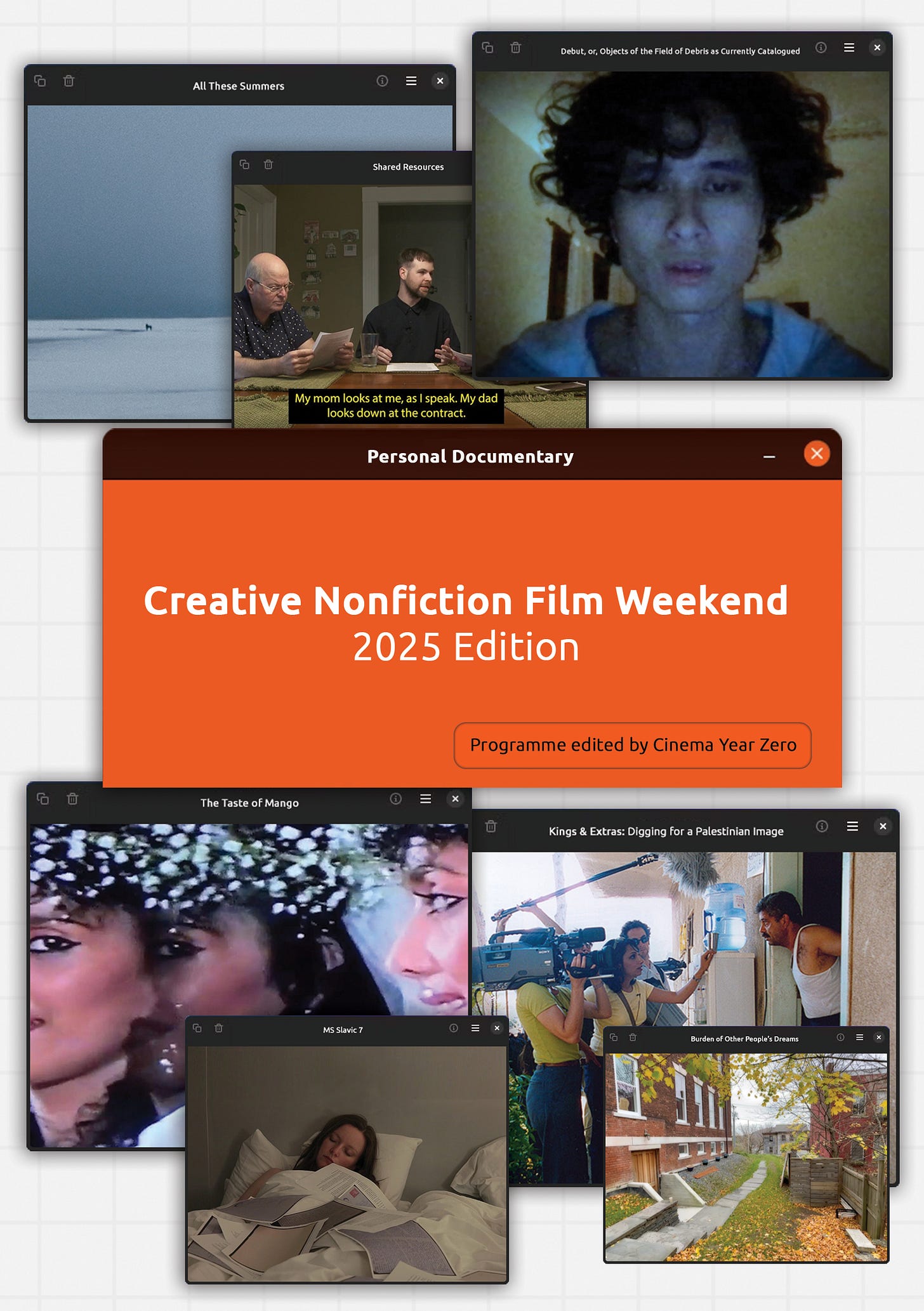VOLUME 21: Creative Nonfiction Film Weekend 2025
We were very happy to produce the print programme for the Creative Nonfiction Film Weekend’s 2nd edition, which took place July 4th-6th at the Rio Cinema in Dalston.
Over the coming weeks we will be publishing the issue online in full, beginning with a note from Festival Co-Director Kimia Ipakchi.
Along with an essay on each film in the programme, VOLUME 21 contains a history of the personal documentary in 10 films, featuring writing on Jonas Mekas, Martha Coolidge, Nathan Fielder, and many more.
This year’s festival had a focus on ‘personal documentary’. In an era of Netflix talking heads and glorified Wikipedia summaries, this sub-genre is often overlooked—and unfairly so. The 8 film programme at CNFW highlighted personality-driven work that pulls questions of ethics into direct conflict with the possibilities of filmmaking technology, giving audiences a chance to encounter ground-breaking documentary work up close. Learn more about the festival here.
Programmers’ Note
After a successful inaugural edition of The Creative Nonfiction Film Weekend (CNFW) last summer, festival co-director Orla Smith and I were even more motivated to prove the cinematic value of nonfiction, because we witnessed audiences’ appetite to see something different. Year one could be considered a sort of ‘intro’ sampling of everything documentary can and should be, but in 2025 we wanted to narrow our focus to something more specific: ‘personal documentary’.
Personal documentary often gets a bad rep. It’s accused of being self-indulgent—is the most interesting documentary subject you could think of really yourself? And that’s not always off base. As we researched this year’s programme, a number of rote patterns emerged, revealing that a fascinating life or familial history can’t compensate for a lack of storytelling vision. In fact, you’ll find that the filmmakers screened at CNFW ‘25 don’t necessarily have exceptional life stories, but they’ve moulded the material of their lives into complex and intriguing shapes. After all, our philosophy around documentary is that it isn’t the subject, but the filmmaker’s perspective on the subject, that matters most.
In our three-day weekend, we present a programme which ranges from family portraits, to films which speak to a broader collective archive, to films that many wouldn’t even consider to be films. Our opening night showcase, Chronically Online: A Personal History of the UK Internet, is a showcase of online moving image by ‘content creators’ and people not usually considered ‘filmmakers’, who have taken to the internet to tell their stories (or have accidentally been caught in a viral moment). To watch online media such as YouTube videos and TikToks collectively on the big screen should be absurd, but you will find it an unmissable experiment in how the context these videos are presented in changes how we perceive their value. In general, we’re interested in showcasing DIY works that demonstrate what’s possible now that filmmaking tools are increasingly democratised (for example, our Saturday night UK Premiere, Debut, or, Objects of the Field of Debris as Currently Catalogued, was made with a budget of $900 USD). We were intrigued to see: if you take away such common barriers to filmmaking, what interesting ways are new stories told? Whose voices are finally heard?
Our Saturday programme explores the different ways personal documentary deals with archive, research, and investigation. MS Slavic 7 and Sofia Bohdanowicz’s broader Audrey project uses a semi-fictional character as a vessel for the filmmaker’s own academic quest to learn about her family history. A lost history is also central to Kings & Extras: Digging for a Palestinian Image, in which Azza El-Hassan investigates the missing Palestinian Film Archive, and in the process creates a film that adds to the broader and expanding archive of Palestinian voices in resistance. Her film is a powerful testament to how personal documentary can act as an opposing force against imperial colonialism and systematic erasure. Julian Castronovo’s Debut, or, Objects of the Fields of Debris as Currently Catalogued takes the common investigation format and combines it with tones of horror. The perfect late night film, Debut raises questions about how our seemingly random curiosities can be a gateway into learning more about ourselves.
We close the festival on Sunday with a trio of films about family and interpersonal relationships. What conversations are enabled when a camera is introduced into a family dynamic? Jordan Lord compellingly raises this question in Shared Resources, a film that draws lines between family, disability, and filmmaking to reconstruct what we consider as ‘debt’. Chloe Abrahams’ The Taste of Mango weaves familiar personal documentary techniques—home video, narration—into a spellbinding and deeply moving account of healing intergenerational trauma. Our closing night film All These Summers draws parallels between the filmmaker Therese Henningsen’s friendship with her recluse neighbour and her father, who is battling depression amidst a new cancer diagnosis, drawing out the beauty and pain in our efforts to understand one another.
Throughout the weekend, we will also be hosting renowned editor Joe Bini’s work-in-progress multimedia piece Burden of Other People’s Dreams. Crossing the experience of reading a book and watching a film, this immersive piece, intended for one audience member at a time, blurs the lines between fiction and nonfiction, raising the question of what stories can be told when the boundaries of form are broken.
We’re grateful for our special documentary-loving community who have helped us put this all together. We couldn't have done it without you and we hope you enjoy the films.
In the issue:
The programmers on Chronically Online video showcase
Joe Bini interviewed by Orla Smith
Emily Jisoo Bowles on MS Slavic 7 + Point and Line to Plane
Arta Barzanji on Kings & Extras: Digging for a Palestinian Image
Ben Flanagan on Debut, or, Objects of the Field of Debris as Currently Catalogued
Tom de Lancy Green on Shared Resources
Kirsty Asher on The Taste of Mango



